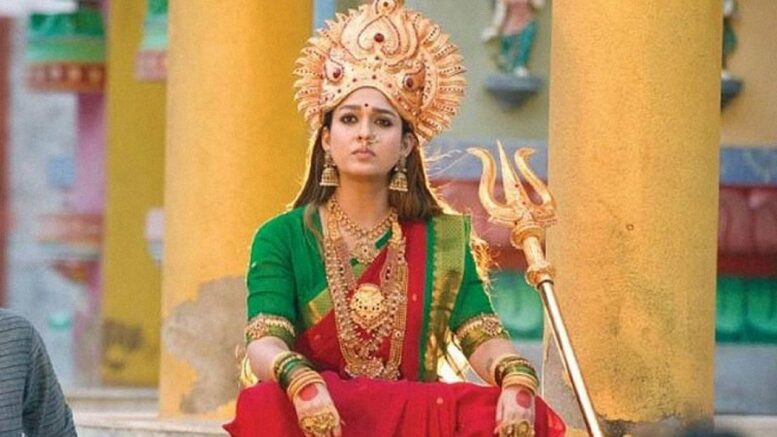Mookuthi Aman has all the crackers for a Diwali celebration – A Saami Padam, family entertainer with an entertaining family at the centre, A lady Superstar and social messaging. The problem is they do not all go off in style or in some cases (like the messaging) create an unpleasant cacophony. The cracker that works as desired is Nayantara.
Nayanthara shines as Mookuthi Amman, delivering a powerhouse performance with unmatched presence and charm
The bona fide superstar of Tamil cinema is magnificent. She has the presence, charm and swag to pull of this role and she does it with elan while also looking like a million dollars and gets the wise quips, slow motion introduction and the climax fights – all prerogatives of a superstar of her stature. She has limited screen time, but fireworks are in display when she appears and is believable as Mookuthi Amman. The other plus point of the movie is Urvashi. Her comic timing is legendary, here she gets the right lines to make her likable in the act. Her white lies, trip(s) to Tirupathi and the Basha Paaru montage are some of the highlights of the movie.
Urvashi’s legendary comic timing adds a delightful touch.
RJ Balaji, the actor takes off from where he left in LKG. His realistic loser humour works in the first half and there are no dull moments. The song he thinks of when he meets Nayantara is a recurring gag in the movie and works fine. Ajay Ghosh plays a mix of many popular God men and Guess the God Men is a game you can play to keep you entertained when he is on screen as he does not do much beyond playing a caricature. With a stronger villain the conflict could have been better constructed and made for a better movie.
RJ Balaji, carrying forward his LKG legacy, provides a humor-packed first half.
RJ Balaji the writer has burdened himself with a lot to pull off, starting with the credits where he lists his inspirations. When you have movies like Oh My God and PK as inspirations and your movie is talking about the same subject, you better pull out a rabbit from the hat. Here at best he ends up showing a glimpse of the rabbit hole. When the movie is moving in independent territory in the first half, it works, even if only in the low hanging joke plucking format.
In the second half, inching towards the ‘inspired’ zone, the movie starts taking itself seriously and that is when the madcap stops working. For example the aspiration of the Amman to reach the popularity of Tirupati works for it eccentricity but the same Amman preaching platitudes on the lines of “God is within you, look no further” evokes nothing more than a nonchalant shrug.
As a festival theater release, Mookuthi Amman would have drawn crowds for its humor and Nayanthara’s star power
RJ Balaji’s character is smartly named Engels Ramaswamy (Friedrich Engels, the philosopher and socialist as explicitly stated by his character and presumably the Ramaswamy part is from Periyar’s given name). and his arc strives to disprove the saying ‘what’s in a name”. He questions the God Men in power and works for freeing the proletariat from the shackles of blind belief. In keeping with the tone of the movie, the second half of the crusade should have been made more humorous and the pre climax could have done without the PK inspired Godmen interview. This last bit is bound to elicit comparison and it becomes a disadvantage for the movie.
While the film excels in the first half, the heavy messaging in the second half veers it towards the ‘inspired’ zone, losing some of its madcap magic
Purely as a festival theatre release (like it was planned to be) Mookuthi Amman, the movie is more than average. Public would have thronged the theatres for the jokes and Nayanthara (and not necessarily in that order). One can only wonder if planned as a straight to OTT release, the jokes could have been more potent, and the flab of messaging could have been discarded. Well, man proposes but God(dess) disposes.

Captive of the 24 frames and admirer of the written word. If it is not on the silver screen or on the pages of a paperback, it might as well not exist.


Be the first to comment on "Mookuthi Amman (Review)"